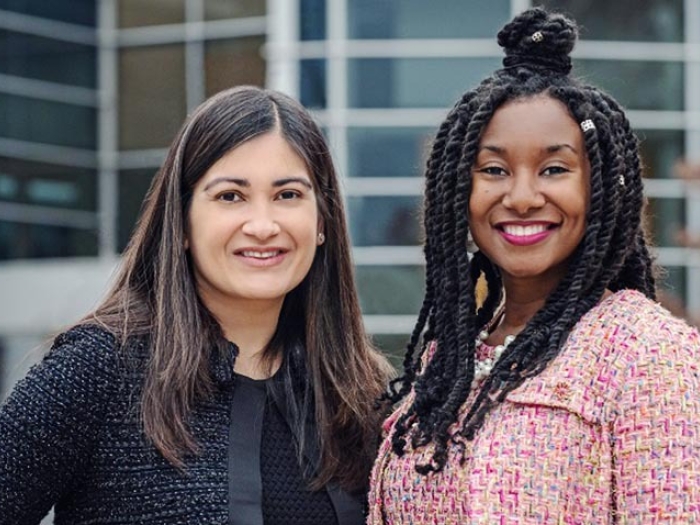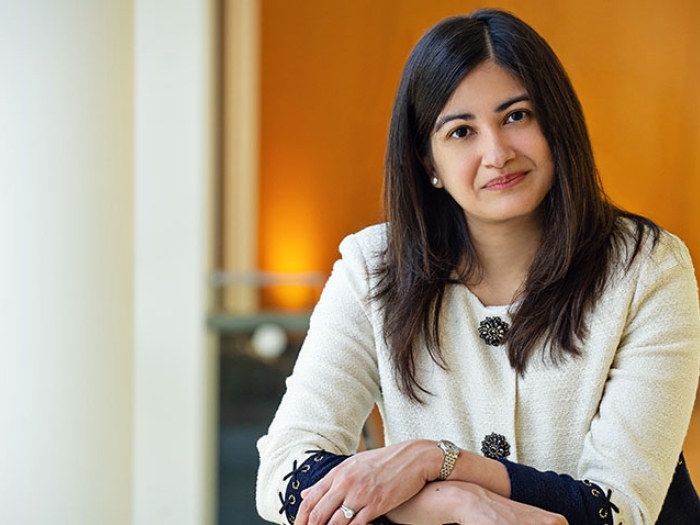Christina Chapman, M.D., sits down for a discussion on diversity, equity and inclusion in medicine.
12:27 PM
Author |

Christina Chapman, M.D., studies ways to improve equity in health care systems and the medical workforce to better meet the needs of the population.
In June, Chapman, a physician-researcher at Michigan Medicine and the VA Ann Arbor Healthcare System, served as a discussant on a panel on workplace inequities at the 2019 American Society of Clinical Oncology's annual meeting in Chicago.
Here, she sits down with Michigan Health Lab for a conversation about diversity, equity and inclusion in medicine.
Tell us about your ASCO presentation.
As a discussant, my role was to help put two submitted research abstracts into a broader context. One was a survey of gynecologic oncologists that looked at the prevalence of sexual harassment and other gender-based challenges in the field. Even in this field that serves women as a patient population, and that has a large number of female physicians, there are still many gender-based challenges. Seven of 10 women surveyed had experienced sexual harassment in training or practice. Incidents weren't reported because victims felt it wasn't important enough (40%), they didn't think anything would be done about it (37%) or they feared reprisal (34%).
The second abstract examined how speakers are introduced at academic meetings — with data drawn from the ASCO annual meeting. The researchers watched all of the presentation videos for the prior two years. They found that women are less likely to be introduced professionally — calling them "Doctor" and their last name, or giving their credentials. Female speakers were more likely to be introduced by first name only — 17% of the time compared to only 3% for men.
Have I been introduced without my credentials? Yes. Have patients called me by my first name? Yes. But not only that, people call me 'baby' or 'sweetie' or 'honey'. No one calls their male physician 'baby'.Christina Chapman, M.D.
And when they looked at who was doing the introducing, they found that men were more likely to introduce people unprofessionally in general, and less likely to introduce women professionally (53%) compared to men (80%).
Esther Choo, M.D., M.P.H., a researcher at Oregon Health & Science University, had an article in the Christmas issue of the BMJ last year titled "A Lexicon for Gender Bias in Academic Medicine". And the behavior is so prevalent, she defined a term for it: "Degree deleting emceeing: When an introducer neglects to use the title 'Doctor' while presenting a female speaker at a conference or similar professional gathering."
Have you personally experienced that?
Yes. This happens all the time. It happens to women all the time. It happens to people of color all the time.
When I was a resident I tried explaining to some of my male physician colleagues that patients called me by my first name even when I introduced myself as "Dr. Chapman." They mostly discounted it, didn't believe it, or they said, "Oh, it's just about the patients feeling more comfortable." But patients don't do that to male doctors nearly as often.
Some of my African American physician colleagues, when they're in the hospital, they'll be handed bed sheets due to the mistaken assumption they're custodial staff. If you're a woman, you're often mistaken for a nurse, even when your name badge is clearly displayed. The problem is not necessarily being confused for another important member of the care team (which includes all hospital staff), but that individuals refuse to treat women and racial/ethnic minority physicians as they would white or male physicians, even when their identities and roles have been made clear.
The introduction study looked at race as well, and it also showed that individuals were also less likely to introduce African Americans and by their professional credentials. So, this study was really important because it showed it is about gender, it is about race.
Are there other examples?
I also talked about other unprofessional terms that women get called in work settings.
Have I been introduced without my credentials? Yes. Have patients called me by my first name? Yes. But not only that, people call me "baby" or "sweetie" or "honey." No one calls their male physician "baby."
I also highlighted several other studies on this topic of bias that manifests as erasure of one's full identity. There was a powerful opinion piece in JAMA titled "My Name is Not 'Interpreter'". It was written by a psychiatrist who talked about how, when he was a trainee, his attending physician would just call him "Interpreter" because he spoke Spanish. He also talks about being mistaken for a valet.
Married or partnered women with children spent 8.5 more hours per week on domestic activities. That's 400-plus hours per year they don't have available for their professional careers, or anything else.Christina Chapman, M.D.
And I discussed some of the data about gender and racial bias around names. There have been a number of studies using resumes, where the researchers varied the gender or race of the applicant. And when it's a black-sounding name or a female-sounding name, you get fewer call-backs, you're perceived as less competent or you get offered a lower salary.
What impacts do these biases end up having?
There are data that show when you remind women of their gender or African-Americans of their race before a test, they do worse. It's called "priming."
So, tying all this together, the point is that if you introduce a male speaker as Dr. Last Name and you introduce me as Christina, you're priming the audience to remember him as a physician, a scholar, a thought-leader, but you're not reminding them of the same thing about me. This may affect the way that the science is both delivered and received, resulting in a waste of resources that were used to generate it.
Furthermore, who are they more likely to invite back next year? Who is more likely to be selected to lead a panel in the future? Who is going to be building up their CV faster and appear more objectively qualified? So you can see how these small, individual, upstream effects can add up — resulting in one candidate appearing more qualified, when in fact, that other candidate was simply subjected to more discrimination along the way.
What do you wish people understood better?
The pushback is often: "So, someone calls you by your first name, so what?"
Studies have shown that discrimination is associated with poor birth outcomes, elevated cortisol levels and shorter telomere length.
We know it's wrong — morally and ethically — to discriminate against people. We know it affects health. But if those things alone were enough, we would have gotten rid of it already.
The business case for caring about these issues is that it results in ineffective use of human capital.
In my discussion, I talked about a landmark study that was published two years ago showing that when patients are taken care of by female physicians they do better. The study found patients treated by women were less likely to be readmitted to the hospital or to die within 30 days.
Now, I don't think that women are inherently better physicians — as someone who's a champion of equality, I don't believe that. I think it's driven by gender roles and socialization. They've shown that women are more likely to adhere to guidelines, but also, as a woman, you're afforded less latitude to deviate from standard-of-care. Women are also more likely to engage in participatory care and decision-making with patients.
As a female physician, I think people expect me to listen to them more. When you're a male physician, I think there's a perception that you're busy, and patients don't want to inconvenience you and take up your time. So maybe patients don't sit there and give male doctors that extra piece of information that's going to make that big difference in their treatment, like they can't actually afford the copay on their prescription.
What's your takeaway?
The point is that when we discriminate against individuals in our health care workforce, we don't benefit fully from their abilities.
The omission of credential is just the tip of the iceberg. Small gears turn larger cogs of bias, which, in turn, start to reallocate human capital in negative ways.
We need to accept that, at this point, we have good data for discrimination. If this were a Phase 3 drug study, tomorrow everyone would be prescribing the drug.
I also talked about the difficulty in achieving gender equity in the workplace without gender equity at home. A survey of academic physicians co-authored by my colleague and mentor, Reshma Jagsi, M.D., M.Phil., found that married or partnered women with children spent 8.5 more hours per week on domestic activities. That's 400-plus hours per year they don't have available for their professional careers, or anything else.
Women also do more of the "domestic work" in academia. They spend more hours teaching. They do more service work, they're on more committees — and more likely to serve on institutional committees versus national committees, with the former sometimes being less influential.
One of my big takeaways was that we need standardized processes to reduce bias — conference introductions, for example. We can't just rely on individuals just being better and think that's going to fix the problem. Tatiana Prowell, M.D., ASCO Cancer Education Committee chair-elect, for example, has expressed her commitment to ensuring all speakers and moderators receive a standardized professional form of address in education sessions at the 2020 meeting.
In June, National Institutes of Health Director Francis Collins issued a public statement saying he would no longer speak on all-male panels. Do you think the field is starting to come around?
Yes, I do. I think social media and the #MeToo movement has drawn a lot of attention to issues of gender bias and sexual harassment — and empowered a lot of people to share their stories.
Regarding Director Collins' announcement, Jack Iwashyna, M.D., Ph.D., a critical care specialist at U-M, has been doing something similar for a long time: responding to invites with an email that says if there are not at least two women on the panel he won't participate — and if they need names, he's happy to suggest them.
Really, we need to understand that discrimination is multifaceted and multi-level. We need to look at institutional, interpersonal and individual mitigation strategies. There's often a focus on individuals and individual racism, sexism and bias, without looking at institutional-level policies and processes.
Chapman is a member of the University of Michigan Rogel Cancer Center and the U-M Institute for Healthcare Policy & Innovation, an assistant professor in the Department of Radiation Oncology at the University of Michigan Medical School, and an affiliate investigator at the VA Center for Clinical Management Research and staff physician at the VA Ann Arbor Healthcare System.
ASCO members can view Chapman's slides or watch a video of her presentation on the meeting website.

Explore a variety of health care news & stories by visiting the Health Lab home page for more articles.

Department of Communication at Michigan Medicine
Want top health & research news weekly? Sign up for Health Lab’s newsletters today!





